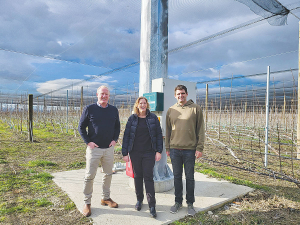New Zealand Cherry Season 2026 Overcomes Weather Setbacks as Late Harvest Boosts Export Prospects
Despite some trying circumstances recently, the cherry season looks set to emerge on top of things.
 GSI Partners Christchurch director Sean Lysaght, Vero executive manager of rural insurance solutions Sonya Whitney and Forest Lodge Orchard’s owner Mike Casey worked together to create an innovative insurance policy which covers Casey’s 100% electricity-powered cherry orchard for losses relating to power cuts.
GSI Partners Christchurch director Sean Lysaght, Vero executive manager of rural insurance solutions Sonya Whitney and Forest Lodge Orchard’s owner Mike Casey worked together to create an innovative insurance policy which covers Casey’s 100% electricity-powered cherry orchard for losses relating to power cuts.
Mike Casey, owner of the world’s first zero fossil fuel orchard, shared his journey to fully electrify his six-hectare orchard at the New Zealand Agricultural Show in Christchurch in November.
Forest Lodge Orchard’s entire commercial operation – which is located in Central Otago – includes New Zealand’s first electric frost fighting fans, plus irrigation, tools and vehicles all powered by electricity generated and stored on farm using solar and batteries.
Casey is currently trialling a converted electric tractor and expects delivery of the country’s first electric tractor next year. He says it is important not to let perfection be the enemy when it comes to making changes on-farm.
“We need to start by looking at the choices we make for things we can control like the equipment we use on our farms,” he explains.
“I have gone ahead and done everything I can do to eliminate reliance on fossil fuels. But farmers can also adopt a stepby- step approach if they want to start going down the same path.”
Casey reckons one option for gradual change is to replace older equipment at the end of its lifespan with new electric equipment.
“I know that not everyone can replace everything all at once, especially if they are not starting from scratch like we did, so I think another way to look at it is when things need replacing.”
During his presentation Casey provided itemised data showing the payback periods and the amount of carbon saved for the full electrification of his farm. This included upgrades for connecting to the grid and the purchase of frost fighting fans, tractor conversion and equipment, an electric sprayer and an electric vehicle.
“For the full electrification of everything on farm there is an incremental payback of seven years and a full payback period of 13 years.”
The orchard harvested its first crop of fossil fuel free cherries last year and he says the key to improving the payback of electrification and solar energy is marketing a premium product which consumers are willing to pay more for and backing this up with hard evidence.
To help other farmers with this, Casey has created a new NZ0 certification which is independently audited by AsureQuality. This certification has strict rules around fossil fuels which means that food producers cannot offset their emissions but instead need to provide evidence of change regarding fossil fuel use.
“This is a vital part of providing consumers with an authentic certification, because the words ‘carbon neutral’ do not necessary mean that the consumers are getting a sustainable product.”
Tailored Insurance
One of the key barriers to Casey setting up a fully electric operation was finding an insurance product that would cover the risk of power cuts to his electric frost fighting fans during the vulnerable spring growing months when young cherries must be protected from the hard frosts in Central Otago.
To be completely fossilfuel free, Casey wanted to avoid using a dieselpowered backup generator. However, he struggled to find an insurance provider that would protect his business against the risk to his crops posed by power cuts.
That was until he started working with GSI Insurance Partners Christchurch director Sean Lysaght and Vero to create an innovative insurance policy that met his unique needs.
“When you are determined to create real change and do it on a large scale you need to remove the blocks that might stop others from following you.”
When Lysaght started working with Casey to create an insurance product to fit the unique circumstances, he needed to find an insurance underwriter who would be willing to think creatively about the situation.
“We approached Vero, and they were willing to collaborate with us to create a new and innovative insurance policy that would cover Mike for any loss of product due to power cuts.”
After spending around 18 months fine tuning the insurance policy, which used interruption cover as a base, Lysaght and Vero created a solution that fits Casey’s unique situation.
Lysaght believes more farmers will be seeking tailored insurance solutions in the future as they move towards implementing sustainable farming to mitigate environmental issues.
Donald Trump's latest tariff tantrum has again thrown the world of trade into a new round of turmoil and uncertainty, and NZ is caught up in it.
The third edition of the NZ Dairy Expo, held in mid-February in Matamata, has shown that the KISS principle (keep it simple stupid) was getting a positive response from exhibitors and visitors alike.
Twenty years ago, South African dairy farm manager Louis Vandenberg was sent to a farm in Waikato to provide training on Afimilk technology.
Strong farmgate milk price is helping boost investment on farms, says PGG Wrightson chief executive Stephen Guerin.
Fonterra's 460 milk suppliers in Australia, who will switch to Lactalis end of this month, are unfazed with the impending change.
The 5+ A Day Charitable Trust has launched a collection of affordable recipes designed to turn everyday vegetables into seasonal stars.

OPINION: A mate of yours truly reckons rural Manawatu families are the latest to suffer under what he calls the…
OPINION: If old Winston Peters thinks building trade relations with new nations, such as India, isn't a necessary investment in…